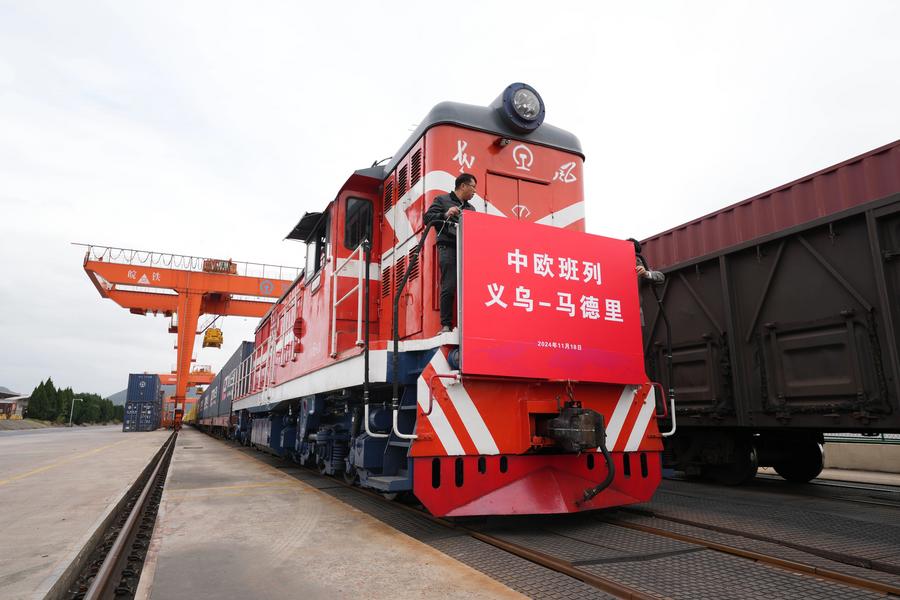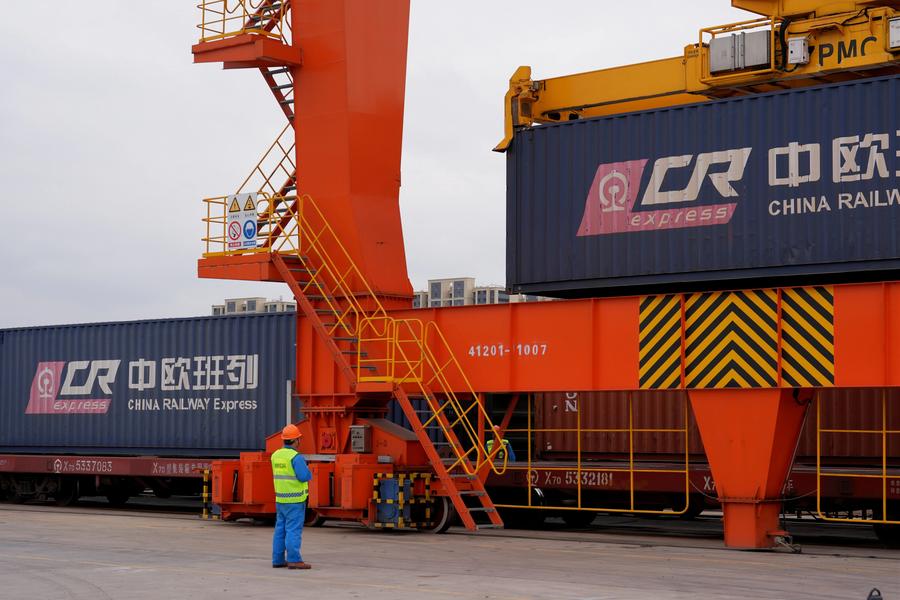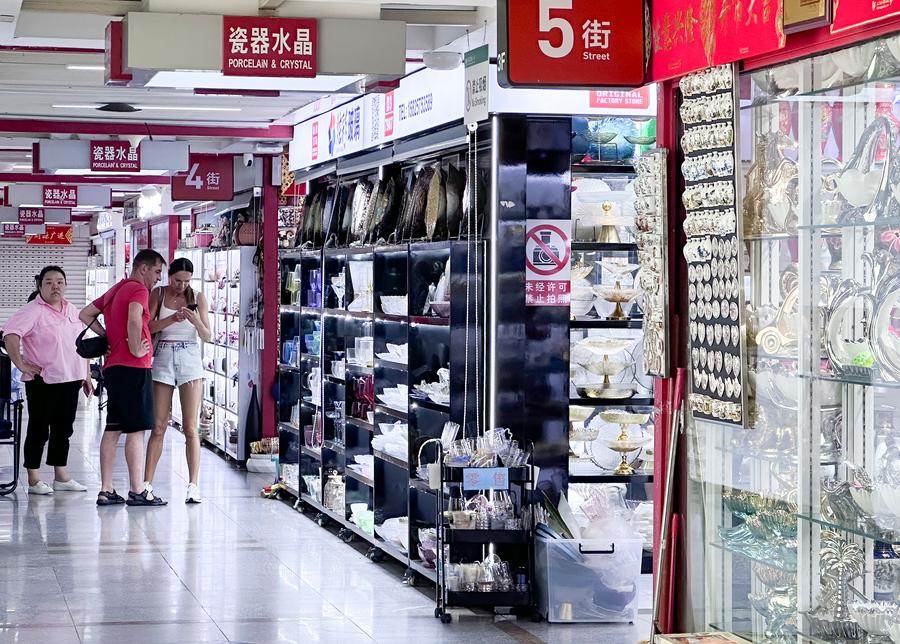Update: China's small commodity hub celebrates decade of China-Europe freight train expansion

A China-Europe freight train is about to depart from Yiwu West Railway Station in Yiwu, east China's Zhejiang Province, Nov. 18, 2024. (Xinhua/Xing Guangli)
YIWU, Zhejiang, Nov. 18 (Xinhua) -- A China-Europe freight train departed from the city of Yiwu in east China's Zhejiang Province on Monday morning heading for Madrid, Spain, marking the 10th anniversary of the launch of this route.
Loaded with 110 twenty-foot equivalent units (TEUs) of various goods including accessories, automotive parts, machinery and equipment, the train is expected to arrive in Madrid within 16 to 18 days.
Over the past decade, more than 6,700 China-Europe freight trains have set off from Yiwu, transporting over 670,000 TEUs of cargo. These trains have provided vital logistical support for the city, which is known as "the world's supermarket," facilitating its access to global markets, according to China State Railway Group Co., Ltd.
"As the world's largest small commodity market, Yiwu exports a substantial number of containerized goods overseas every day. In the past, we primarily relied on sea freight," said Feng Xubin, chairman of the freight train service operator Yiwu Tianmeng Industrial Investment Co., Ltd.
Feng noted that over the past ten years, the composition of the goods transported by these trains has undergone a significant upgrade.
"I still remember the first China-Europe freight train carrying items such as suitcases, stationery and Christmas decorations. However, as market demands have evolved, we now ship a growing number of high-value-added products, including various types of machinery and electronic equipment," Feng said.
In addition to traders based in Yiwu and other parts of Zhejiang, the China-Europe freight train service is also attracting an increasing number of customers from surrounding regions, such as the Yangtze River Delta, Feng added.

A container is lifted onto a China-Europe freight train at Yiwu West Railway Station in Yiwu, east China's Zhejiang Province, Nov. 18, 2024. (Xinhua/Xing Guangli)
From 2014 until now, the annual number of China-Europe freight train trips from Yiwu has soared from just 23 to over 1,100. Annual cargo value has risen from 92 million U.S. dollars to 2.62 billion U.S. dollars, while the variety of transported goods has expanded from about 10,000 to nearly 50,000 categories.
To date, the China-Europe freight train service has connected Yiwu with more than 160 cities in 50 countries and regions across Asia and Europe.
On Nov. 18, 2014, the first China-Europe freight train (Yiwu-Madrid) departed, opening a fast rail route for small commodity exports from this Chinese city to Europe.
Meerzat Omuralieva, general manager of Mika Import & Export Co., Ltd, heard her cousins sharing details of their experiences in China and speaking Chinese at a family gathering when she was young. Inspired by their stories, she decided to make her own mark in China.
Omuralieva pursued studies at a college in Yiwu and graduated in 2020, after which she established a foreign trade company focused on exporting accessories from China to Kyrgyzstan.
"The opening of the China-Europe freight train service greatly boosted our export business. All five Central Asian countries are landlocked, therefore, thanks to this service, transportation has now become much more convenient," Omuralieva said.

Foreign merchants select goods at the Yiwu International Trade Market in Yiwu, east China's Zhejiang Province, July 29, 2024. (Xinhua/Li He)
Zhejiang Mundiver Import & Export Co., Ltd. has been trading with Spain since 2008, importing a wide range of Spanish products, including the likes of mineral water, olive oil, sunflower oil, wine, ham and more. The company initially relied on sea freight for foreign trade.
"Traditional sea freight usually takes 45 days and often involves secondary transfers at ports, but the China-Europe freight train takes less than 20 days," said Kong Zhijian, the company's marketing manager.
"The introduction of the China-Europe freight train service in 2014 greatly facilitated our trade channels. This service has enabled us to export domestic products to Europe and import products from countries along the route," Kong said, adding that the shorter transit time gives them greater flexibility in terms of cash flow management, which is very important for their operations.
Thanks to the service and its expansion over the years, Kong's company has grown steadily and now has numerous agents and franchisees in places like Jiangsu, Sichuan, Guangdong, Qinghai and other regions.
The China-Europe freight train service offers a sound logistics experience to its customers, with a transit time that is only one-third of the duration required by sea freight and transportation costs just one-fifth of what is necessary for air freight, according to Bei Xudong, deputy director of Yiwu's market development committee.
"With its advantages of low cost, high efficiency, extensive routes and year-round service, it has supported the stability of supply chains across the province, the country and even along the route," Bei said.
"Over the past decade, China-Europe freight trains have deeply integrated with the city's development, playing an indispensable role in China-Europe trade," he added.
- Year of the Snake festive goods strike gold at "world's supermarket"
- 1st inbound China-Europe freight train carrying goods for Spring Festival arrives in Xi'an
- GLOBALink | China-Europe freight train service boosts trade, prosperity
- Horgos Port facilitates 8,541 China-Europe freight train trips by Dec. 24 in 2024
- China's Yiwu to launch new round of int'l trade reforms


